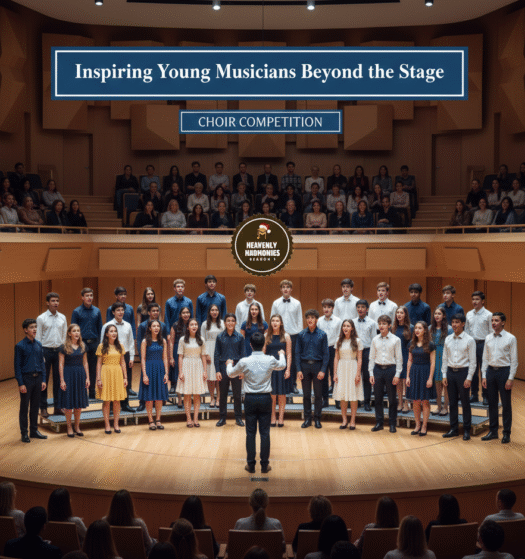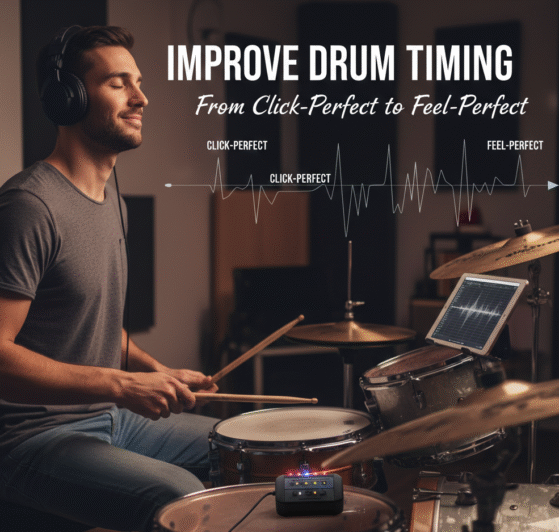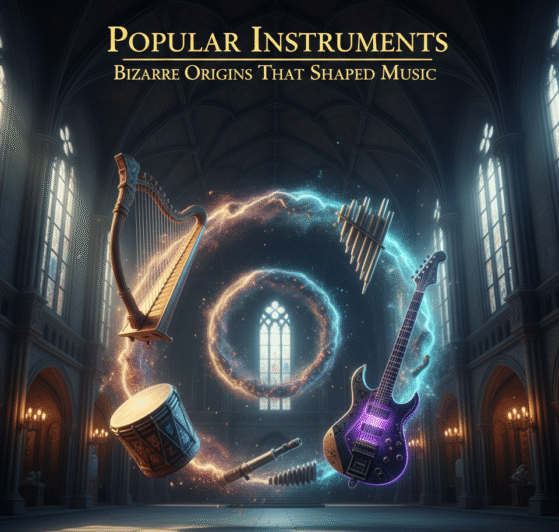How to Develop a Daily Ear Training Routine
In the world of music, having a well-trained ear is as important as finger agility or vocal control. Whether you’re a beginner or an advanced musician, Daily Ear Training Routine helps you recognize pitches, intervals, chords, rhythms, and progressions. It deepens your musical understanding and makes you a more expressive, intuitive performer.
But like any skill, ear training needs regular practice. A daily ear training routine—tailored to your level and goals—can significantly improve your musicality in just a few minutes a day. This blog will show you how to build one that’s engaging, effective, and sustainable.
Why Ear Training Matters

Ear training bridges the gap between what you hear and how you play. It helps you:
Identify and reproduce melodies by ear
Recognize chord progressions in songs
Improve sight-singing and transcription
Play or improvise in any key
Communicate better in ensembles or bands
When you hear better, you play better. That’s the core of ear training.
Step-by-Step: Build Your Daily Routine

1. Warm Up with Pitch Matching (5 minutes)
Start with simple pitch-matching exercises. Use a piano, app, or online tone generator.
Hear a note, then sing or play it back
Test both single notes and short melodic fragments
2. Practice Intervals (5–10 minutes)
Ear training begins with recognizing distances between two notes:
Start with major and minor seconds and thirds
Gradually add perfect fourths, fifths, and beyond
Use apps like Tenuto, EarMaster, or ToneGym
3. Chord Identification (5 minutes)
Start with basic triads:
Major, minor, diminished, augmented Progress to 7th chords, suspended chords, and extensions.
Play or listen to a chord, then name it
4. Melodic Dictation (10 minutes)
This trains your brain to convert sound into notation:
Listen to short melodies and try to write them down
Apps and websites like Musictheory.net offer great tools for this
Start simple, then increase length and complexity
5. Rhythmic Dictation (5 minutes)
Clap or write down rhythms you hear:
Begin with quarter and eighth note rhythms
Add rests, syncopation, and triplets as you improve
6. Play-by-Ear Practice (10 minutes)
Choose a simple song and try to play it by ear:
No sheet music—just listen and find the notes
Start with nursery rhymes or familiar tunes
Slowly work up to pop songs or hymns
7. Transcribe a Short Passage Weekly
Pick one piece per week and transcribe a few bars:
Could be jazz solos, melodies, or chord progressions
Write it down and check against the original
This reinforces everything you’ve practiced
Tips to Stay Consistent and Motivated

Set a fixed time each day (like brushing teeth!)
Keep it short and focused (20–30 mins max)
Use engaging apps or online games
Track your progress in a practice journal
Celebrate milestones (e.g., identify all intervals perfectly)
How The Mystic Keys Incorporates Ear Training
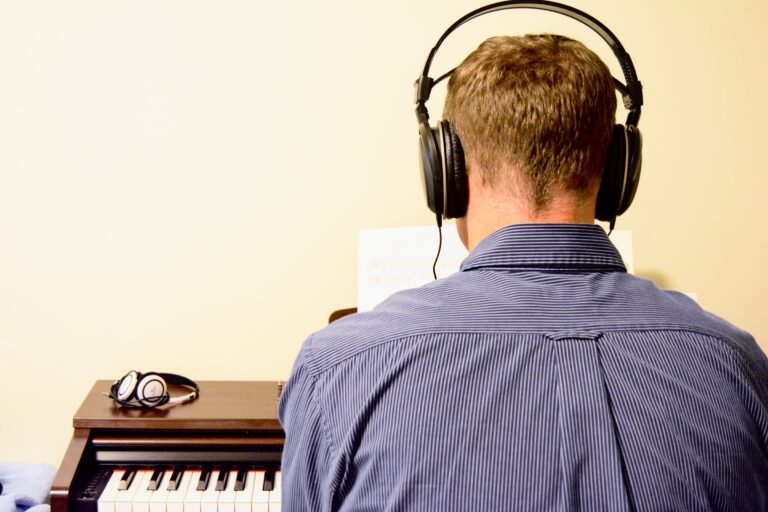
At The Mystic Keys, we embed Daily Ear Training Routine, into every course—whether it’s piano, guitar, or voice. Our trained teachers guide students through interactive activities, using real-time ear exercises in Zoom sessions. We provide customized weekly assignments and audio challenges to build listening skills steadily.
Students receive session recordings and ear training PDFs designed for different age groups and levels. Whether you’re training for a Trinity College exam or just learning for fun, ear development is always a part of your musical journey with us.
About The Mystic Keys

The Mystic Keys is an online music academy committed to high-quality, flexible music education. We offer one-on-one lessons in piano, keyboard, guitar, vocals, music theory, and more. All lessons are taught by certified, experienced teachers who provide customized notes, class recordings, and structured paths for every student.
Conclusion: Make Your Ears Your Superpower
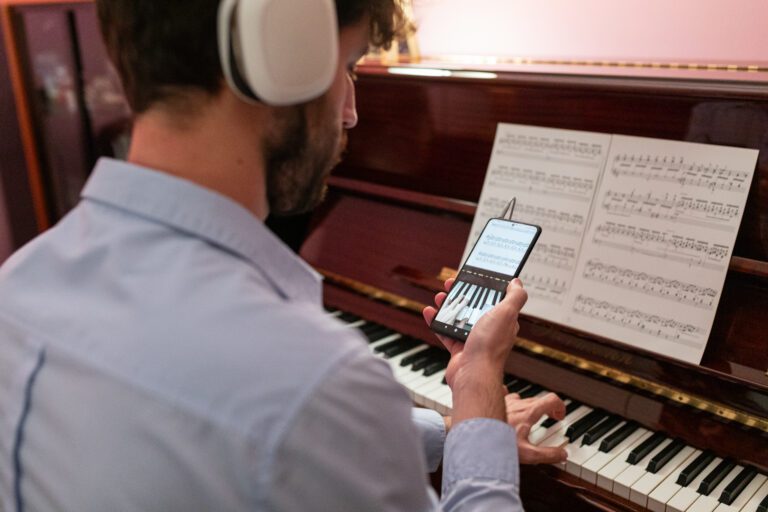
Daily Ear Training Routine isn’t just for advanced musicians or conservatory students. It’s for everyone who wants to feel music more deeply, understand it more clearly, and express it more freely.
By practicing just a little every day—with a balanced routine—you’ll see dramatic improvements in how you hear, play, and enjoy music.
Let your ears lead the way. Start today, and let music speak to you in ways it never has before.
Happy training!
Explore Piano Lessons online designed to help you improve your musical timing with techniques like metronome practice, tapping, and rhythm drills for better accuracy.
For more information and exciting resources about learning music, visit our website at The Mystic Keys. For more music content and exciting offers follow us on
Facebook, Instagram, YouTube, LinkedIn, Twitter, Pinterest, Reddit, Threads,
and Quora.
Related Blogs
The Science of Sight-Reading: How to Read Piano Music Faster
Sight-reading is one of the most essential skills for any pianist. It allows you to play new music on the spot without having to memorize it first. But for many learners, it’s a challenging task that feels slow and frustrating.
How to Develop Finger Independence for Smooth Piano Playing
Developing finger independence is a cornerstone of proficient piano playing. It enables pianists to execute complex passages with precision, expressiveness, and fluidity.
Mastering Piano – Finger Placement Basics from The Mystic Keys
At The Mystic Keys, we emphasize the importance of proper finger placement as the foundation for any pianist’s journey. Whether you’re just starting or refining your technique, mastering finger placement will not only improve your speed and precision but also prevent strain and fatigue.



